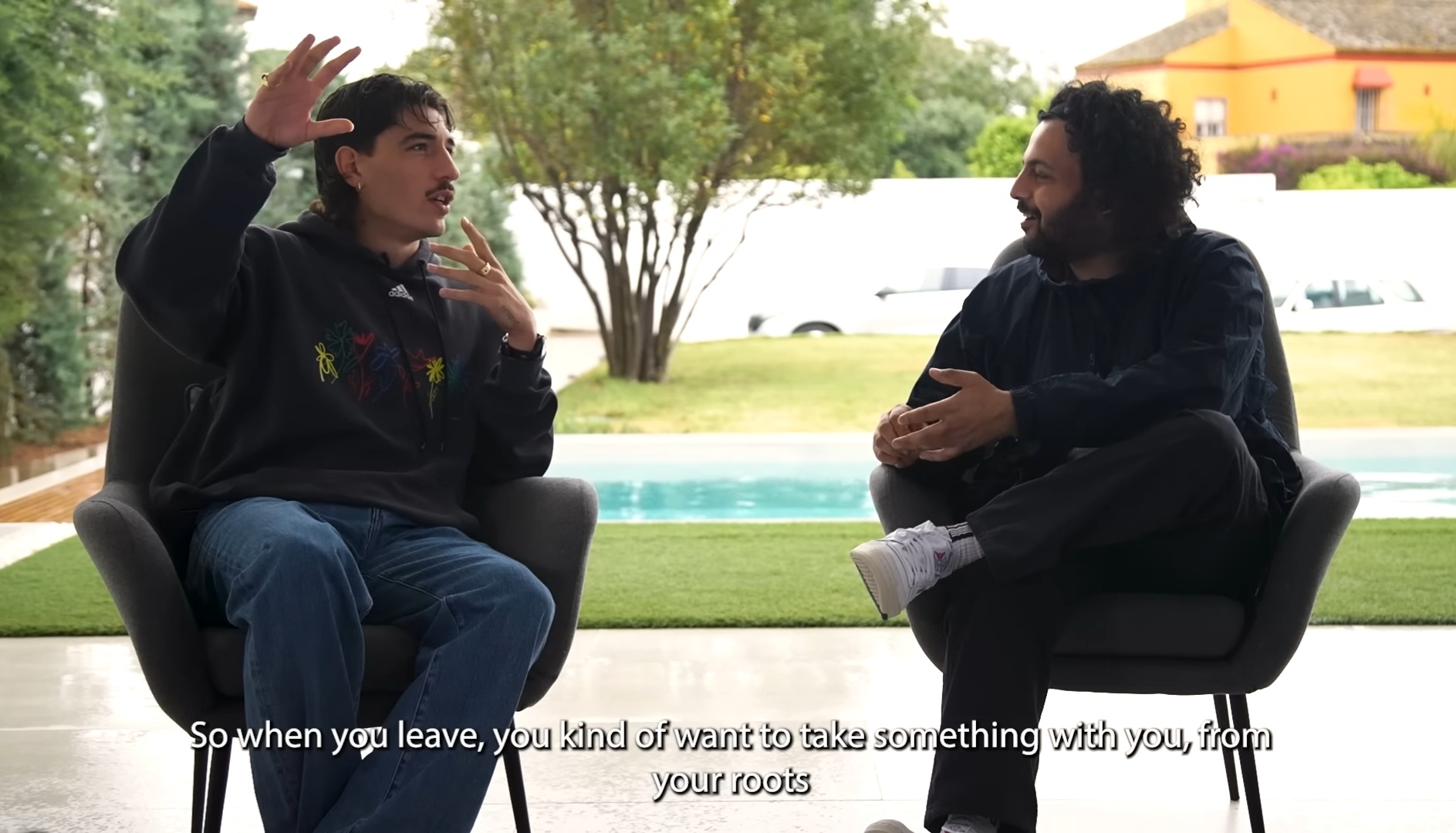After all of us Betis fans have enjoyed the wonderful documentary that Eli Mengem has dedicated to Real Betis Balompié in his Copa 90 Once in a lifetime series, we have been able to sit down and have a quiet chat with him. Do you want to know what the man who directed and recorded the documentary that everyone is talking about thinks about Betis? Stay with us and enjoy the interview.
1) You’ve been travelling and working in the football world for years, why did you think the story of Betis and their third Copa del Rey deserved to be told?
Well it’s quite complicated. It wasn’t that I thought ‘oh Betis is in the cup final, lets go.’I was working on a show we wanted to make about along the idea of “How Football explains the world we live in” – As you know I don’t like football for sport (even though it is the most beautiful sport in the world) but I like it because it reflects society.
So we were working on a show for that idea and I had ten episodes I had come up with and I had to bring it down to three. One of those episodes was on Hector Bellerin and his time at Betis. I think Hector is one of the most fascinating people in football because of the way he talks, thinks and dresses and so much more.
I saw an interview with him about his dad being a Betico and how his dad couldn’t convince Hector to also be a Betico, instead Hector supported Barcelona and it really got to me because it really upsets me when I see kids support more successful teams over their family team… but then he left Arsenal, probably the biggest team in London to go play at Betis for a pay cut and he looked so happy and I just thought… ok something special is going on here.
So that was the original story that was going to be part of the original series… but then I realised many of the ten stories involved teams that were about to win something and I could only select three stories… so instead we changed the show idea to “Once in a Lifetime” about teams about to win something and then I would still explain how the clubs reflect the society within those stories. Next thing you know, I was off to Seville to make the show as Episode 1!
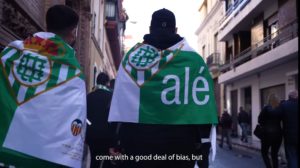
2) Did what you experience exceeded your expectations, was it worth the week you spent in Seville?
Joder. What do you think? I have always loved Seville and found it a fascinating place from the culture to the history to the food to the humour, the love of football… not to mention how I fall in love every five minutes walking down the street in that city… but it was especially nice this time because of the feelings the cup final brought all week.
3) You had already seen a Betis match, specifically the 3-5 derby. What did that match mean to you? Did it change the conception you had of Betis?
The match, no. I wasnt near where the away fans were sitting so I couldn’t really see or hear them that well but the training session before, yes. Betis allowed us to be on the pitch beforehand and the way people were supporting the boys train really blew me away. To be honest, as that was a home match at the Pizjuan I feel like that episode really didn’t allow us to fully see the Betis side of things.

4) You have experienced many derbies in first person, is the Seville derby as special as they say?
Yes, definitely. Obviously I got to go to a game that ended 3-5, the biggest ever score in the history of the show but I really got the feeling that it was a special fixture whenever, just cause the passion for football is genuinely so big in the city and region and also because people just love to live and express themselves so much in the city.
But I should be clear and honest, it’s one of the most fun, and noisy from both sides. Sevilla fans were brilliant before the game at the Pizjuan and as someone who has been privileged enough to be welcomed by both sets of fans I just think it’s such a perfect reflection for how passionate and fun Andalusians are.
5) You were able to be present at the Cartuja and learn first-hand about the behaviour of Betis fans during the final. What struck you the most?
Well there was a lot I noticed, but the main one was the nerves, obviously I understand because it’s so rare how often you make a final but to see people that stressed, it just blew me away. Before the game started the Cartuja was full of Beticos waving scarves and dancing and singing and then it’s like everyone had a stomach bug, people were just shaking and tense and it was bizarre. Don’t get me wrong every now and then there was some amazing songs and clapping but overall it felt like a tough experience for the fans, but I guess it’s just a reflection of how long you’ve waited to win something and how nervous you were not to let that be even longer.
A great example, which didn’t make the film, I wasn’t able to film it because it was at the very back behind the last row at the cartuja but there was one or two guys who never really watched the matched, they just walked back and forth poking their head around to sometimes watch because they were so nervous and stressed.
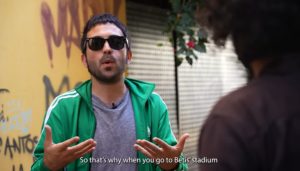
6) You know our slogan «Viva el Betis manquepierda». How do you understand that a team embraces its defeats as an inherent part of its life?
Well. For me, this is almost my favourite thing about the club. I will never forget making the episode of Derby Days in Valencia. And we went to Valencia’s training ground and on the main pitch is this big sign by their legend Aragones: «Ganar y ganar y ganar y volver a ganar, eso es el fútbol» And I thought… what the fuck. That’s not what football is about. Winning? How can it be about winning? Especially in Spanish football. Two, maximum three teams have even a chance at winning La Liga for the past thirty years, so that means the other 17 teams are not representing what football is about? To me, you learn so much more about yourself when you don’t win and I think clubs who don’t see their identity in their wins but something else are a far more true representation of what football is than teams like Madrid and Barca and Valencia who can only be happy with constantly winning. Of course you want to win, and of course you want to succeed, especially when you wait as long as Betis have (and let’s be honest it’s so much more fun when you have to wait for it) but winning is not a reflection of a club’s identity, especially in a world as uneven and unfair as Spanish football and Betis accept this and have the maturity to understand their brilliance is in other ways. So I completely understand this saying, and I wish more clubs and more fan bases would embrace this way of thinking.
7) You were at Bellerín’s house two days before the final. How did Héctor live the hours before the final? How does a player of his stature live that feeling of belonging to Betis that he inherited from his father?
It’s funny with Hector, because unlike most Betico’s, he’s used to cup finals. He’s won three of them with Arsenal. But then there’s his family, who are die hard Betico’s and were living with him that weekend before the game. His grandma and dad in particular are super fans and they were there in the house, sleeping there, eating there, so as calm as he was there nerves must have been felt a bit, right? So it felt like a mix. He was half super calm and relaxed about it, but there felt like a touch of uncertainty due to Betis past.
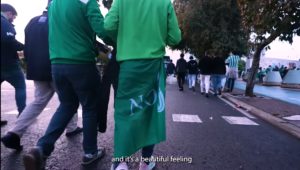
8) The growth of Betis in recent years is undeniable, what is your perception of the club from the outside?
Hmmm. Well living in London I can definitely tell you there is a fascination with Betis. So many people when I told them I was making this show told me, ‘Oh I love that club or Oh! I have always wanted to go the villamarin’. Some said it was because of the Denilson purchase, others because they holidayed in the south of Spain and bought a shirt, but there is definitely this soft spot people here in England have for the club.
9) When filming the match you crossed paths with one of us and told him that you had never filmed anything like this in your life. What made it so special?
I think it was just happiness. It was so evident, people just wanted to celebrate Betis. There was no tension, no looking for trouble, just the urge to sing about your club. That and how many women were out in Betis colours, it was almost 50/50 and I rarely see that in my travels and I just think that’s so special and important because football is for everyone and Betis really represents that.
10) You have known what the Betis people are like, you have seen us win a derby and win a title, is there any team or any fan that reminds you of Betis?
That’s a good question. I don’t think so. I would say maybe Boca? I mean don’t get me wrong, as much as I love the Villamarin even it is not as loud as the Bombonera, that really is the craziest stadium on earth, but more because Boca’s fans are also super intense and eccentric but the thing is, Boca have won a lot. Betis fans have this epic passion and they have it with so few titles, which to me is something even more impressive because it means this passion doesn’t come from winning things it comes from much more pure means.
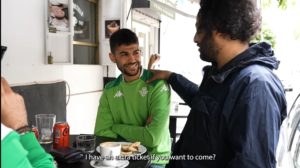
11) In the documentary you get a ticket for Álvaro and you live the match with him. How did you live it? What did he transmit to you?
I should say, first and foremost, as much as I gave the ticket to him, you guys at Bohemio were the ones to recommend him to have the ticket, so it is just as much thanks to you as it is me that he was able to go…
As for Alvaro, well I could make a documentary just on him and our short time together. He was an absolute sweetheart. I can’t lie, when we gave him the ticket we told him, hey the one condition is you have to stick with us and let us film you at the game and he said of course but then right after I gave him the ticket at the Almeda he disappeared and I thought ‘you little shit’ but it was just a miscommunication and he was great, he even helped us sneak the camera into the ground as many people may not know but in typical RFEF fashion they denied us accreditation, despite all the spanish derby days episodes we’ve made.
But for me the most special thing about Alvaro and what I learnt from him was how much Betis was about so much more than even a football club… Every time I asked anything about Betis or the match or previous matches he’d reference his dad or his grandad or another family member and it became clear Betis for him wasn’t just about him but about his love for his family and his childhood and his nostalgia. This is what we tried to include, when I asked how he was feeling at the Almeda, instead of good or bad or “I’m excited” it was… im thinking of my grandfather. Then, the first thing he did in the stadium was facetime his dad… literally as we walked up the stairs before we even saw the pitch he just started calling him and I thought that was really something special and showed me how Betis isn’t just about a team’s connection with yourself it’s about sharing moments and passions with the people you love most, weather thats your dad or uncle or your friend. Another example about how football, unlike any other sport is not a sport, but something much deeper.

